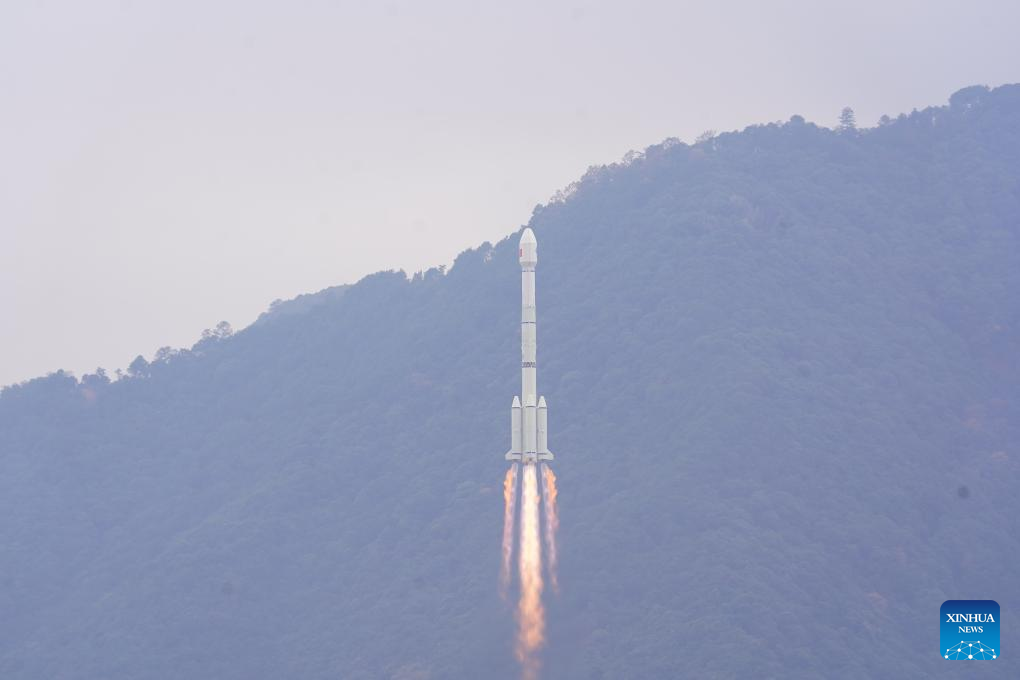A Long March-3B carrier rocket and the Yuanzheng-1 (Expedition-1) upper stage attached to the carrier rocket, carrying two new satellites for the BeiDou-3 Navigation Satellite System (BDS-3), blast off from the Xichang Satellite Launch Center in southwest China's Sichuan Province, Dec. 26, 2023. The two satellites, the 57th and 58th satellites of the BeiDou system, were launched at 11:26 a.m. (Beijing Time). (Photo by Qiu Lijun/Xinhua) XICHANG, Dec. 26 (Xinhua) -- China on Tuesday sent two new satellites for the BeiDou-3 Navigation Satellite System (BDS-3) into space successfully from the Xichang Satellite Launch Center in southwest China's Sichuan Province. The two satellites, the 57th and 58th satellites of the BeiDou system, were launched at 11:26 a.m. (Beijing Time) by a Long March-3B carrier rocket and the Yuanzheng-1 (Expedition-1) upper stage attached to the carrier rocket. They are the first medium-Earth orbit (MEO) satellites launched since BDS-3 was formally commissioned to provide satellite navigation services worldwide. After entering their orbit and completing in-orbit tests, they will be connected to the BeiDou system. Compared to previous MEO satellites of the BeiDou system, the newly launched satellites have upgraded functions and performance in various areas, including global short message communication capacity, onboard atomic clock technology, and intelligent payloads. They will upgrade the reliability and service capabilities of the BeiDou system. They will also lay the foundation for the development of next-generation BDS satellites. The launch was the 504th mission for the Long March series carrier rockets. The satellites and launch vehicle were respectively developed by the China Academy of Space Technology (CAST) and the China Academy of Launch Vehicle Technology, both of which are affiliated with the China Aerospace Science and Technology Corporation. The two satellites will play multiple roles by effectively expanding the communication capacity of BeiDou's global short messages, upgrading the performance monitoring of the integrity of its navigation signals globally, and more, said Xie Jun, deputy chief designer of the BDS. On July 31, 2020, China commissioned BDS officially, opening BDS-3 to global users, making China the third country around the world to have an independent global navigation satellite system. ■ A Long March-3B carrier rocket and the Yuanzheng-1 (Expedition-1) upper stage attached to the carrier rocket, carrying two new satellites for the BeiDou-3 Navigation Satellite System (BDS-3), blast off from the Xichang Satellite Launch Center in southwest China's Sichuan Province, Dec. 26, 2023. The two satellites, the 57th and 58th satellites of the BeiDou system, were launched at 11:26 a.m. (Beijing Time). (Photo by Qiu Lijun/Xinhua) A Long March-3B carrier rocket and the Yuanzheng-1 (Expedition-1) upper stage attached to the carrier rocket, carrying two new satellites for the BeiDou-3 Navigation Satellite System (BDS-3), blast off from the Xichang Satellite Launch Center in southwest China's Sichuan Province, Dec. 26, 2023. The two satellites, the 57th and 58th satellites of the BeiDou system, were launched at 11:26 a.m. (Beijing Time). (Photo by Qiu Lijun/Xinhua) A Long March-3B carrier rocket and the Yuanzheng-1 (Expedition-1) upper stage attached to the carrier rocket, carrying two new satellites for the BeiDou-3 Navigation Satellite System (BDS-3), blast off from the Xichang Satellite Launch Center in southwest China's Sichuan Province, Dec. 26, 2023. The two satellites, the 57th and 58th satellites of the BeiDou system, were launched at 11:26 a.m. (Beijing Time). (Photo by Qiu Lijun/Xinhua)



China launches new satellites to enhance BDS-3 services
Editor:谭婕倪
Source:Xinhua
Updated:2023-12-27 16:18:44
Source:Xinhua
Updated:2023-12-27 16:18:44
Special
Contact
Welcome to English Channel! Any suggestion, welcome.Tel:0731-82965627
lisl@rednet.cn
zhouqian@rednet.cn











